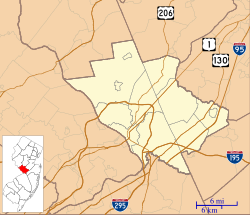History
In the 1820s, an attempt was made to organize teaching in law, but this plan ended following the death of the designated professor.
The Law School at the College of New Jersey began instruction in 1847 as a modest effort consisting of three professors: Joseph Coerten Hornblower, Richard Stockton Field, and James S. Green. [2] Only seven students obtained a law degree before the school closed in 1852. The short-lived experiment was the furthest the university got in a recurring ambition, marked by varying levels of effort, to establish a law school.
In 1890, Princeton President Francis Landey Patton lamented that Princeton had faculties of philosophy and theology but needed to send Princeton graduates to Harvard or Columbia to study law. [2]
From 1923 to 1925, the university once again formed appreciable plans for the start of a law school but abandoned the idea due to cost and financial risk. [2] In 1974, then president of Princeton, William G. Bowen, selected a committee to investigate and advise on the achievability of a law school. [3] The committee recommended plans for a law school be deferred after citing high construction costs.
Besides Princeton, Brown and Dartmouth are the two other Ivy League schools to lack a law school.
Mistaken and fictional references
At a press conference of law school deans in 1998 decrying the annual US News Law School Rankings, then New York University School of Law Dean John Sexton quipped, "If they were asked about Princeton Law School, it would appear on the top 20 -- but it doesn't exist" [8] Sexton was denouncing the US News usage of reputation survey results from judges, lawyers and law school deans in its ranking formula, expressing doubt over the expertise of some surveyed.
A 2003 National Review Online commentary blundered when the author, Candace de Russy, identified the law school at Princeton as real: "These yearnings are embodied in a doctrine called ‘transnational progressivism,’ which is gaining prominence in law schools, for example, at Princeton and Rutgers". [9]
Similarly, during the Senate Judiciary Committee vote for Supreme Court nominee Samuel Alito, Sen. Richard Durbin attested that now Justice Alito hailed from "Princeton Law." Alito attended Princeton University for his undergraduate studies, but received his law degree from Yale Law School.
This page is based on this
Wikipedia article Text is available under the
CC BY-SA 4.0 license; additional terms may apply.
Images, videos and audio are available under their respective licenses.




